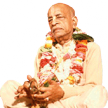Pride - an essential subject: Difference between revisions
Visnu Murti (talk | contribs) (Created page with "Category:Essential Subjects <!----------------------- edit below this line -----------------------> <!------------------------ begin introduction text below --------------...") |
(Vanibot #0041: Moves Choose Another box to the end) |
||
| Line 2: | Line 2: | ||
<!----------------------- edit below this line -----------------------> | <!----------------------- edit below this line -----------------------> | ||
<!------------------------ begin introduction text below ------------------------> | <!------------------------ begin introduction text below ------------------------> | ||
People become proud over materialistic accomplishments. Those who do austerities or penances seeking for honor, respect and position are full of material pride. However, one may feel spiritual pride after becoming a pure servant of the Lord, and that, Srila Prabhupada says, is glorious. | |||
Srila Prabhupada's books, lectures, conversations and letters offer a comprehensive presentation of this essential subject as seen in the Vaniquotes '''[[Vaniquotes:Category:Pride|Pride]]''' category. An introduction from his books is given below in the following 12 quotes. | Srila Prabhupada's books, lectures, conversations and letters offer a comprehensive presentation of this essential subject as seen in the Vaniquotes '''[[Vaniquotes:Category:Pride|Pride]]''' category. An introduction from his books is given below in the following 12 quotes. | ||
<!-------- end introduction text and don't touch next three lines ---------> | <!-------- end introduction text and don't touch next three lines ---------> | ||
---- | ---- | ||
== Quotes from Srila Prabhupada's books == | == Quotes from Srila Prabhupada's books == | ||
| Line 17: | Line 17: | ||
{{VaniQuotebox|Maharaja Pariksit felt proud, therefore, that he happened to be the descendant of such great devotees. Such pride for the devotees of the Lord is certainly not equal to the puffed-up sense of vanity for material prosperity|Mahārāja Parīkṣit felt proud, therefore, that he happened to be the descendant of such great devotees. Such pride for the devotees of the Lord is certainly not equal to the puffed-up sense of vanity for material prosperity. The first is reality, whereas the other is false and vain. '''(Śrīmad-Bhāgavatam 1.19.13)'''}} | {{VaniQuotebox|Maharaja Pariksit felt proud, therefore, that he happened to be the descendant of such great devotees. Such pride for the devotees of the Lord is certainly not equal to the puffed-up sense of vanity for material prosperity|Mahārāja Parīkṣit felt proud, therefore, that he happened to be the descendant of such great devotees. Such pride for the devotees of the Lord is certainly not equal to the puffed-up sense of vanity for material prosperity. The first is reality, whereas the other is false and vain. '''(Śrīmad-Bhāgavatam 1.19.13)'''}} | ||
{{VaniQuotebox|One's desire to hide his real mentality is called avahittha, or concealment, and a desire to exhibit superiority is called pride. Both of these may be classified under pretension. In a pretentious attitude both avahittha and pride are to be found|One's desire to hide his real mentality is called avahitthā, or concealment, and a desire to exhibit superiority is called pride. Both of these may be classified under pretension. In a pretentious attitude both avahitthā and pride are to be found. '''(Nectar of Devotion 31)'''}} | {{VaniQuotebox|One's desire to hide his real mentality is called avahittha, or concealment, and a desire to exhibit superiority is called pride. Both of these may be classified under pretension. In a pretentious attitude both avahittha and pride are to be found|One's desire to hide his real mentality is called avahitthā, or concealment, and a desire to exhibit superiority is called pride. Both of these may be classified under pretension. In a pretentious attitude both avahitthā and pride are to be found. '''(Nectar of Devotion, Chapter 31)'''}} | ||
{{VaniQuotebox|Pride in victory, or moroseness in defeat, is useless. One should fully depend on the Supreme Personality of Godhead, who is responsible for the victory and defeat of all living entities|Victory is always with the Supreme Personality of Godhead. As for the subordinate living entities, they fight under the arrangement of the Supreme Personality of Godhead. Victory or defeat is not actually theirs; it is an arrangement by the Lord through the agency of material nature. Pride in victory, or moroseness in defeat, is useless. One should fully depend on the Supreme Personality of Godhead, who is responsible for the victory and defeat of all living entities. '''(Śrīmad-Bhāgavatam 6.12.7)'''}} | {{VaniQuotebox|Pride in victory, or moroseness in defeat, is useless. One should fully depend on the Supreme Personality of Godhead, who is responsible for the victory and defeat of all living entities|Victory is always with the Supreme Personality of Godhead. As for the subordinate living entities, they fight under the arrangement of the Supreme Personality of Godhead. Victory or defeat is not actually theirs; it is an arrangement by the Lord through the agency of material nature. Pride in victory, or moroseness in defeat, is useless. One should fully depend on the Supreme Personality of Godhead, who is responsible for the victory and defeat of all living entities. '''(Śrīmad-Bhāgavatam 6.12.7)'''}} | ||
| Line 30: | Line 30: | ||
{{VaniQuotebox|Those who cannot avoid oversleeping, who cannot avoid the pride of enjoying material objects, who are always dreaming of lording it over the material world...are considered to have determination in the mode of ignorance|Those who cannot avoid oversleeping, who cannot avoid the pride of enjoying material objects, who are always dreaming of lording it over the material world, and whose life, mind and senses are thus engaged, are considered to have determination in the mode of ignorance. '''(Bhagavad-gītā 18.35)'''}} | {{VaniQuotebox|Those who cannot avoid oversleeping, who cannot avoid the pride of enjoying material objects, who are always dreaming of lording it over the material world...are considered to have determination in the mode of ignorance|Those who cannot avoid oversleeping, who cannot avoid the pride of enjoying material objects, who are always dreaming of lording it over the material world, and whose life, mind and senses are thus engaged, are considered to have determination in the mode of ignorance. '''(Bhagavad-gītā 18.35)'''}} | ||
{{VaniQuotebox|Great personalities of power and opulence never become proud, and the example is given that a tree which is full of fruits and flowers does not stand erect in pride but instead bends downwards to show submissiveness| | {{VaniQuotebox|Great personalities of power and opulence never become proud, and the example is given that a tree which is full of fruits and flowers does not stand erect in pride but instead bends downwards to show submissiveness|Great personalities of power and opulence never become proud, and the example is given that a tree which is full of fruits and flowers does not stand erect in pride but instead bends downwards to show submissiveness. This is a sign of the wonderful character of great personalities. '''(Śrīmad-Bhāgavatam 4.21.5)'''}} | ||
{{VaniQuotebox|Expressions of ecstatic love in pride may be the result of excessive wealth, exquisite beauty, a first-class residence or the attainment of one's ideal goal. One is also considered proud when he does not care about the neglect of others|Expressions of ecstatic love in pride may be the result of excessive wealth, exquisite beauty, a first-class residence or the attainment of one's ideal goal. One is also considered proud when he does not care about the neglect of others. Bilvamaṅgala Ṭhākura said, "My dear Kṛṣṇa, You are leaving me, forcibly getting out of my clutches. But I shall be impressed by Your strength only when You can go forcibly from the core of my heart." This is an instance of feeling pride in ecstatic love for Kṛṣṇa. '''(Nectar of Devotion 29)'''}} | {{VaniQuotebox|Expressions of ecstatic love in pride may be the result of excessive wealth, exquisite beauty, a first-class residence or the attainment of one's ideal goal. One is also considered proud when he does not care about the neglect of others|Expressions of ecstatic love in pride may be the result of excessive wealth, exquisite beauty, a first-class residence or the attainment of one's ideal goal. One is also considered proud when he does not care about the neglect of others. Bilvamaṅgala Ṭhākura said, "My dear Kṛṣṇa, You are leaving me, forcibly getting out of my clutches. But I shall be impressed by Your strength only when You can go forcibly from the core of my heart." This is an instance of feeling pride in ecstatic love for Kṛṣṇa. '''(Nectar of Devotion, Chapter 29)'''}} | ||
{{VaniQuotebox|Everywhere people express this astonishment at the sincerity of the devotees, and we take great pride in the transcendental behavior of our students|Even Christian priests are greatly surprised that all these boys from Jewish and Christian families have joined this Kṛṣṇa consciousness movement; before joining, they never regarded any principles of religion seriously, but now they have become sincere devotees of the Lord. Everywhere people express this astonishment, and we take great pride in the transcendental behavior of our students. Such wonders are possible, however, only by the mercy of Śrī Caitanya Mahāprabhu. They are not ordinary or mundane. '''(Caitanya-caritāmṛta, Ādi-līlā 17.1)'''}} | {{VaniQuotebox|Everywhere people express this astonishment at the sincerity of the devotees, and we take great pride in the transcendental behavior of our students|Even Christian priests are greatly surprised that all these boys from Jewish and Christian families have joined this Kṛṣṇa consciousness movement; before joining, they never regarded any principles of religion seriously, but now they have become sincere devotees of the Lord. Everywhere people express this astonishment, and we take great pride in the transcendental behavior of our students. Such wonders are possible, however, only by the mercy of Śrī Caitanya Mahāprabhu. They are not ordinary or mundane. '''(Caitanya-caritāmṛta, Ādi-līlā 17.1)'''}} | ||
| Line 40: | Line 40: | ||
'''Pride - [[Vaniquotes:Category:Pride|explore more within this category]]'''. | '''Pride - [[Vaniquotes:Category:Pride|explore more within this category]]'''. | ||
{{EsentialSubjectTotal}} | {{EsentialSubjectTotal}} | ||
<div style="float:left;"> | |||
{{EssentialSubjectnav}} | |||
</div> | |||
__NOTOC__ | __NOTOC__ | ||
__NOEDITSECTION__ | __NOEDITSECTION__ | ||
Latest revision as of 17:12, 22 November 2020
People become proud over materialistic accomplishments. Those who do austerities or penances seeking for honor, respect and position are full of material pride. However, one may feel spiritual pride after becoming a pure servant of the Lord, and that, Srila Prabhupada says, is glorious.
Srila Prabhupada's books, lectures, conversations and letters offer a comprehensive presentation of this essential subject as seen in the Vaniquotes Pride category. An introduction from his books is given below in the following 12 quotes.
Quotes from Srila Prabhupada's books
Pride - explore more within this category.
Vanipedia has now over 903 introductory articles compiled from Srila Prabhupada's books under the series titled Essential Subjects. All these articles can be seen in the Table of Content on the right side of this article and also here in this Umbrella Category. Browse through them to relish the breadth and depth of Srila Prabhupada's teachings - There is a subject for everyone.











